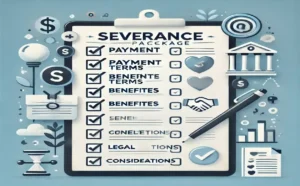Real Estate Tax Lawyers: Your Guide to Property Tax Expertise

Navigating the complex landscape of real estate taxes can be challenging, and having the support of an experienced professional can be incredibly helpful. This is why the knowledge of real estate tax lawyers is so essential. These legal professionals specialize in the complexities of property taxation, offering their knowledge and skills to individuals and businesses alike, as they navigate the often perplexing landscape of real estate tax law.
In this comprehensive guide, we’ll explore everything you need to know about real estate tax lawyers – from their roles and responsibilities to when you might need one and how to choose the right professional for your needs. Whether you’re a first-time homebuyer, a seasoned real estate investor, or a business owner dealing with commercial property taxes, this article will provide valuable insights into the world of real estate tax law.
- What is a Real Estate Tax Lawyer?
- The Importance of Real Estate Tax Lawyers
- Key Differences Between a Real Estate Tax Lawyer and a General Real Estate Lawyer
- Duties and Functions of Real Estate Tax Lawyers
- When Do You Need a Real Estate Tax Lawyer?
- How to Choose the Right Real Estate Tax Lawyer
- The Process of Working with a Real Estate Tax Lawyer
- Common Real Estate Tax Issues
- The Impact of Real Estate Tax Laws on Different Types of Properties
- Real Estate Tax Lawyers and Property Development
- The Function of Real Estate Tax Lawyers in Commercial Leasing
- Real Estate Tax Lawyers and Property Tax Appeals
- The Intersection of Real Estate Tax Law and Other Legal Areas
- The Future of Real Estate Tax Law
- Frequently Asked Questions (FAQs)
- Conclusion
What is a Real Estate Tax Lawyer?
A real estate tax lawyer is a legal professional who specializes in the complex field of property taxation. These experts have in-depth knowledge of both real estate law and tax law, allowing them to provide specialized advice and representation in matters related to property taxes. Real estate tax lawyers work with a wide range of clients, including:
- Individual homeowners
- Real estate investors
- Commercial property owners
- Real estate developers
- Corporations with significant real estate holdings
Their expertise covers various aspects of property taxation, from annual property tax assessments to more complex issues like tax appeals, exemptions, and abatements.
The Importance of Real Estate Tax Lawyers
Why get a property tax attorney? Simply put, property tax rules are complex, and making the wrong tax decisions can cost you significant money. A skilled tax lawyer helps you navigate these challenges and potentially save thousands. Here are a few key reasons why real estate tax lawyers are important:
- Expertise in a complex field: Property tax laws can be intricate and vary significantly by location. A real estate tax lawyer has the specialized knowledge to navigate these complexities.
- Potential for significant savings: By identifying opportunities for tax savings or successfully appealing unfair assessments, a real estate tax lawyer can potentially save you thousands of dollars.
- Protection of your rights: These professionals ensure that your rights as a property owner are protected throughout any tax-related processes.
- Peace of mind: Having an expert manage your property tax issues can offer you a great sense of reassurance and comfort.
Key Differences Between a Real Estate Tax Lawyer and a General Real Estate Lawyer
The key differences between a real estate tax lawyer and a general real estate lawyer are:
Area of Focus
- Property tax attorneys focus on the tax side of buying, selling, and owning real estate. They’re experts in handling the complex tax issues that come with property transactions.
- General real estate lawyers have a broader focus on all legal aspects of real estate, including transactions, disputes, zoning, and property rights.
Expertise
- Real estate tax lawyers have in-depth knowledge of tax codes, regulations, and strategies related to real estate.
- General real estate lawyers have broader knowledge covering various aspects of property law, contracts, and transactions.
Primary Responsibilities
Real estate tax lawyers:
- Provide guidance on the tax consequences of real estate transactions.
- Help minimize tax liabilities
- Assist with tax planning for property investments
- Handle tax disputes with authorities like the IRS
General Real Estate Lawyers
- Review and prepare real estate contracts
- Conduct title searches and resolve title issues
- Assist with property transactions (buying, selling, leasing)
- Handle general real estate disputes and litigation
Client Base
- Real estate tax lawyers often work with high-net-worth individuals, real estate investors, and corporations with complex tax situations.
- General real estate lawyers typically serve a wider range of clients, including individual homebuyers, sellers, landlords, and tenants.
Education and Certifications
- Both necessitate a law degree and admission to the bar.
- Real estate tax lawyers may pursue additional certifications in tax law or have a background in accounting.
- General real estate lawyers may seek certifications in real estate law but don’t necessarily need specialized tax credentials.
Typical Tasks
- Real estate tax lawyers may spend more time on tax research, planning, and resolving tax disputes.
- General real estate lawyers typically handle a wider variety of tasks, including drafting contracts, conducting closings, and resolving property disputes.
Collaboration
- Real estate tax lawyers often work alongside general real estate lawyers, accountants, and financial advisors to provide comprehensive guidance on complex transactions.
- General real estate lawyers may collaborate with tax specialists when needed but can handle many aspects of real estate transactions independently.
In short, while both types of lawyers work in the real estate field, real estate tax lawyers focus specifically on the tax implications of property ownership and transactions, whereas general real estate lawyers address a wider array of legal matters related to real estate. The choice between the two depends on the specific needs of the client and the complexity of the tax situation involved in the real estate matter.
Duties and Functions of Real Estate Tax Lawyers
Real estate tax lawyers wear many hats in their professional capacity. Let’s break down some of their key roles and responsibilities:
1. Tax Assessment Reviews
One of the primary responsibilities of a real estate tax lawyer is to review property tax assessments. They examine the assessed value of a property to ensure it’s fair and accurate. If they find discrepancies, they can help clients challenge the assessment and potentially lower their tax bill.
2. Property Tax Appeals
When a property owner disagrees with their tax assessment, a real estate tax lawyer can guide them through the appeal process. This involves:
- Gathering evidence to support the appeal
- Preparing and filing necessary documentation
- Representing the client in hearings or negotiations with tax authorities
3. Tax Planning and Strategy
Real estate tax lawyers assist clients in creating strategies to reduce their property tax obligations. This might involve:
- They help you understand how your property deals will affect your taxes
- Identifying potential tax exemptions or credits
- Structuring real estate investments in tax-efficient ways
4. Legal Document Preparation
These professionals draft and review various legal documents related to property taxes, including:
- Tax appeal petitions
- Settlement agreements
- Property tax exemption applications
5. Representation in Tax Disputes
In cases where property tax disputes escalate to litigation, real estate tax lawyers represent their clients in court. They prepare legal arguments, present evidence, and advocate for their clients’ interests before judges or tax tribunals.
When Do You Need a Real Estate Tax Lawyer?
While not every property-related transaction requires the expertise of a real estate tax lawyer, there are several situations where their services can be invaluable:
- Purchasing high-value property: For significant real estate investments, a tax lawyer can help you understand and plan for the tax implications.
- Appealing property tax assessments: If you believe your property has been unfairly assessed, a lawyer can guide you through the appeal process.
- Dealing with complex real estate transactions: For commercial properties or large-scale developments, a tax lawyer can help navigate the intricate tax landscape.
- Facing an audit: If you’re being audited for property-related taxes, a real estate tax lawyer can represent your interests.
- Seeking tax exemptions or abatements: A lawyer can help you identify and apply for potential tax breaks you might be eligible for.
How to Choose the Right Real Estate Tax Lawyer
Selecting the right real estate tax lawyer is crucial. Keep these suggestions in mind as you decide:
- Look for specialized experience: Ensure the lawyer has specific experience in real estate tax law, not just general tax or real estate law.
- Check credentials: Verify the lawyer’s education, certifications, and bar admission status.
- Consider their track record: Look for a lawyer with a history of successful outcomes in cases similar to yours.
- Evaluate communication skills: Choose a lawyer who can explain complex tax concepts in terms you can understand.
- Assess their availability: Ensure the lawyer has the capacity to give your case the attention it deserves.
- Consider fees: Understand the lawyer’s fee structure and ensure it aligns with your budget and the potential benefits of their services.
The Process of Working with a Real Estate Tax Lawyer
Working with a real estate tax lawyer typically involves several steps:
- Initial consultation: You’ll meet with the lawyer to discuss your situation and goals.
- Case evaluation: The lawyer will review your property tax documents and assess your case.
- Strategy development: Together, you’ll develop a plan of action to address your property tax concerns.
- Implementation: The lawyer will carry out the agreed-upon strategy, which may involve filing appeals, negotiating with tax authorities, or representing you in court.
- Follow-up: After the immediate issue is resolved, your lawyer can provide ongoing advice to help you manage future property tax matters.
Common Real Estate Tax Issues
Real estate tax lawyers deal with a wide range of issues. Some of the most common include:
- Overassessment of property value
- Incorrect classification of property (e.g., commercial vs. residential)
- Failure to account for property depreciation
- Disputes over property tax exemptions
- Issues related to property tax abatements for development projects
- Challenges to special assessments or levies
The Impact of Real Estate Tax Laws on Different Types of Properties
Real estate tax laws can affect different types of properties in various ways:
Residential Properties
For homeowners, property taxes are often one of the largest annual expenses. Real estate tax lawyers can help homeowners ensure they’re not overpaying and take advantage of any available exemptions or credits.
Commercial Properties
Commercial property taxes can significantly impact a business’s profitability. Tax lawyers help businesses manage these costs and navigate complex issues like depreciation and improvement assessments.
Investment Properties
For real estate investors, grasping and handling property taxes is essential for optimizing returns. Tax lawyers can provide strategic advice on structuring investments and managing tax liabilities across a portfolio of properties.
Agricultural Properties
In many areas, agricultural land is eligible for special tax benefits. Real estate tax lawyers can help farmers and landowners understand and qualify for these programs.
Real Estate Tax Lawyers and Property Development
In the field of property development, real estate tax lawyers are essential. They can:
- Advise on the tax implications of different development strategies
- Help secure tax incentives for development projects
- Navigate complex zoning and land use tax issues
- Assist with tax increment financing (TIF) arrangements
- Manage property tax obligations during the development process.
The Function of Real Estate Tax Lawyers in Commercial Leasing
Commercial leases often involve complex tax considerations. Real estate tax lawyers can:
- Review and negotiate tax-related clauses in lease agreements
- Advise on the tax implications of different lease structures
- Assist in settling disagreements about tax obligations between landlords and tenants.
- Assist with tax planning for both landlords and tenants
Real Estate Tax Lawyers and Property Tax Appeals
One of the most common reasons people seek out real estate tax lawyers is for help with property tax appeals. The appeal process typically involves:
- Examining the tax assessment for mistakes or inflated valuations
- Gathering evidence to support a lower valuation
- Filing the necessary appeal documentation
- Representing the property owner in hearings or negotiations
- If necessary, litigating the case in tax court
A skilled real estate tax lawyer can significantly increase your chances of a successful appeal and potential tax savings.
The Intersection of Real Estate Tax Law and Other Legal Areas
Real estate tax law doesn’t exist in isolation. It frequently overlaps with various other legal fields, such as:
- Estate planning: Property taxes can have significant implications for estate planning and inheritance.
- Business law: For companies with significant real estate holdings, property taxes are an important consideration in overall business strategy.
- Environmental law: Environmental regulations can impact property values and, consequently, property taxes.
- Land use and zoning law: Zoning changes can affect property values and tax assessments.
Real estate tax lawyers often need to coordinate with experts in these other fields to provide comprehensive advice to their clients.
The Future of Real Estate Tax Law
Like many legal fields, real estate tax law is always changing and developing. Some trends to watch include:
- Increasing use of technology in property assessments
- Growing complexity in tax incentive programs for development
- Changes in tax laws related to remote work and commercial real estate
- Evolving approaches to taxing short-term rentals and vacation properties
Real estate tax lawyers play a crucial role in helping clients navigate these changes and plan for the future.
Frequently Asked Questions (FAQs)
What exactly does a real estate tax lawyer do?
A real estate tax lawyer specializes in property-related tax issues, helping clients with tax assessments, appeals, planning, and disputes.
When should I consider hiring a real estate tax lawyer?
Consider hiring one for high-value property purchases, tax appeals, complex real estate transactions, audits, or when seeking tax exemptions.
How much does a real estate tax lawyer typically cost?
Costs can differ significantly depending on the location, the complexity of the case, and the lawyer’s level of experience. Some work on hourly rates, while others may offer flat fees for specific services.
Can a real estate tax lawyer help me lower my property taxes?
Yes, they can potentially help lower your taxes by identifying errors in assessments, finding applicable exemptions, or successfully appealing your property valuation.
How do real estate lawyers and property tax attorneys differ in what they do?
While both deal with property law, a real estate tax lawyer specifically focuses on tax-related aspects of property ownership and transactions.
What is the usual duration of a property tax appeal process?
The timeline can vary greatly depending on your location and the complexity of your case, but it often takes several months to a year.
Do I need a real estate tax lawyer for a residential property purchase?
For most standard residential purchases, you may not need one. However, for high-value properties or complex situations, their expertise can be valuable.
Can a real estate tax lawyer help with business property taxes?
Yes, they can assist businesses with commercial property tax issues, including assessments, appeals, and strategic tax planning.
What documents should I prepare before meeting with a real estate tax lawyer?
Gather your property tax bills, assessment notices, property details, and any relevant financial documents related to the property.
How often should I have my property taxes reviewed by a professional?
It’s a good idea to review your property taxes annually, especially if there have been significant changes to your property or local tax laws.
Conclusion
Real estate tax lawyers play a vital role in helping property owners, investors, and developers navigate the complex world of property taxation. From ensuring fair assessments to strategic tax planning, these professionals offer valuable expertise that can lead to significant financial benefits. Whether you’re a homeowner looking to appeal your property tax assessment, a business owner managing commercial property taxes, or a developer seeking to optimize the tax aspects of your projects, a knowledgeable real estate tax lawyer can be an incredibly valuable resource.
Remember, while property taxes may seem like a fixed cost, there’s often room for optimization and savings with the right expertise on your side. By understanding when and how to leverage the skills of a real estate tax lawyer, you can ensure you’re not leaving money on the table when it comes to your property taxes.






